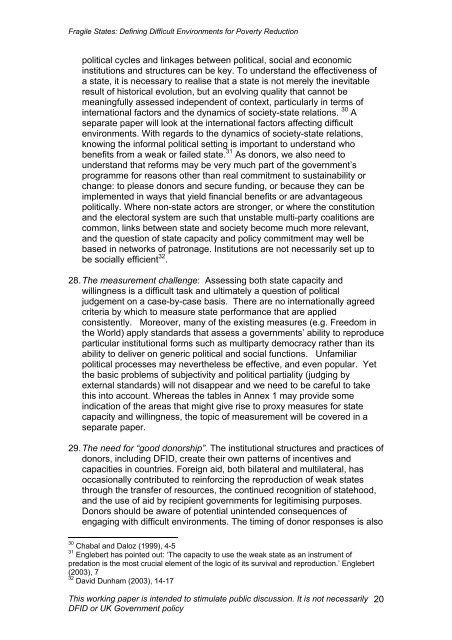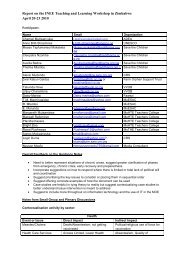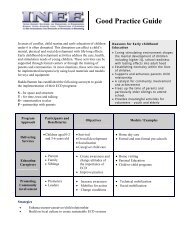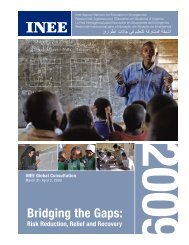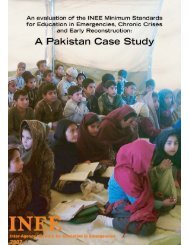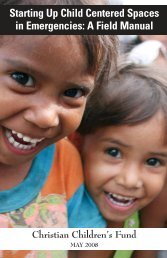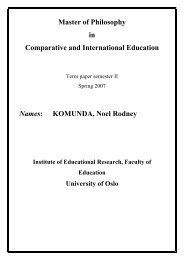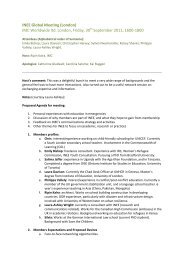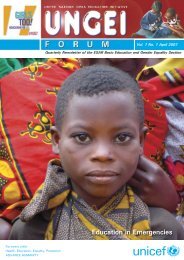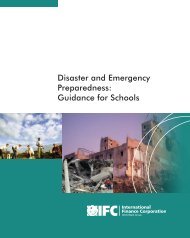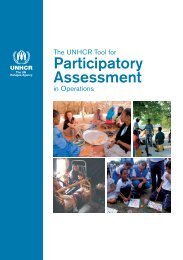Fragile States: Defining Difficult Environments for Poverty ... - INEE
Fragile States: Defining Difficult Environments for Poverty ... - INEE
Fragile States: Defining Difficult Environments for Poverty ... - INEE
You also want an ePaper? Increase the reach of your titles
YUMPU automatically turns print PDFs into web optimized ePapers that Google loves.
<strong>Fragile</strong> <strong>States</strong>: <strong>Defining</strong> <strong>Difficult</strong> <strong>Environments</strong> <strong>for</strong> <strong>Poverty</strong> Reductionpolitical cycles and linkages between political, social and economicinstitutions and structures can be key. To understand the effectiveness ofa state, it is necessary to realise that a state is not merely the inevitableresult of historical evolution, but an evolving quality that cannot bemeaningfully assessed independent of context, particularly in terms ofinternational factors and the dynamics of society-state relations. 30 Aseparate paper will look at the international factors affecting difficultenvironments. With regards to the dynamics of society-state relations,knowing the in<strong>for</strong>mal political setting is important to understand whobenefits from a weak or failed state. 31 As donors, we also need tounderstand that re<strong>for</strong>ms may be very much part of the government’sprogramme <strong>for</strong> reasons other than real commitment to sustainability orchange: to please donors and secure funding, or because they can beimplemented in ways that yield financial benefits or are advantageouspolitically. Where non-state actors are stronger, or where the constitutionand the electoral system are such that unstable multi-party coalitions arecommon, links between state and society become much more relevant,and the question of state capacity and policy commitment may well bebased in networks of patronage. Institutions are not necessarily set up tobe socially efficient 32 .28. The measurement challenge: Assessing both state capacity andwillingness is a difficult task and ultimately a question of politicaljudgement on a case-by-case basis. There are no internationally agreedcriteria by which to measure state per<strong>for</strong>mance that are appliedconsistently. Moreover, many of the existing measures (e.g. Freedom inthe World) apply standards that assess a governments’ ability to reproduceparticular institutional <strong>for</strong>ms such as multiparty democracy rather than itsability to deliver on generic political and social functions. Unfamiliarpolitical processes may nevertheless be effective, and even popular. Yetthe basic problems of subjectivity and political partiality (judging byexternal standards) will not disappear and we need to be careful to takethis into account. Whereas the tables in Annex 1 may provide someindication of the areas that might give rise to proxy measures <strong>for</strong> statecapacity and willingness, the topic of measurement will be covered in aseparate paper.29. The need <strong>for</strong> “good donorship”. The institutional structures and practices ofdonors, including DFID, create their own patterns of incentives andcapacities in countries. Foreign aid, both bilateral and multilateral, hasoccasionally contributed to rein<strong>for</strong>cing the reproduction of weak statesthrough the transfer of resources, the continued recognition of statehood,and the use of aid by recipient governments <strong>for</strong> legitimising purposes.Donors should be aware of potential unintended consequences ofengaging with difficult environments. The timing of donor responses is also30 Chabal and Daloz (1999), 4-531 Englebert has pointed out: ‘The capacity to use the weak state as an instrument ofpredation is the most crucial element of the logic of its survival and reproduction.’ Englebert(2003), 732 David Dunham (2003), 14-17This working paper is intended to stimulate public discussion. It is not necessarilyDFID or UK Government policy20


